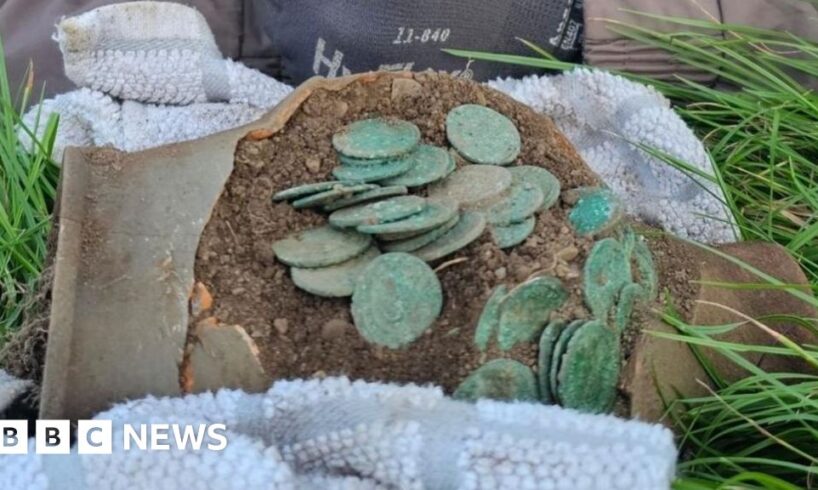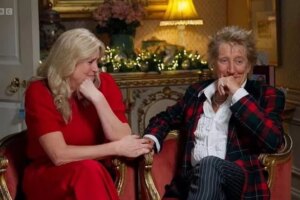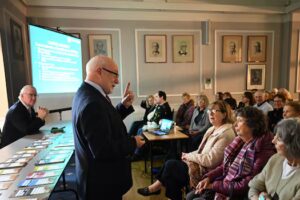
Minelab
David Moss found two clay pots in a field in north Wales containing thousands of Roman coins
A metal detectorist has discovered up to15,000 Roman coins, which could be the biggest hoard ever discovered in Wales.
David Moss, 36, from Cheshire, was left in disbelief and said he had “goosebumps” after digging up two clay pots in north Wales.
But the epic find left him fearing they could be stolen, so he slept with them in his car for three days before taking them to experts.
The coins are now in the safe hands of the National Museum Cardiff where they will be analysed, but one expert believes it will likely prove to be the biggest ever discovery in Wales.
While not wanting to give specific details of where he found them, David described the area as a “virtually untouched” area of north Wales.
“You’re talking from the times of the druids and the Vikings right through to the Romans,” he said.
“I just find it fascinating.
“It’s an area that I’ll be interested in for the rest of my life.”
There have been several coin “hoards” found over the years, usually deliberately buried and never recovered, typically during periods of turmoil or as a religious offering to the gods.
More than 50,000 Roman coins were found in a field in Somerset, England, in 2010 with a total value of £320,250.
In Wales, nearly 6,000 coins were found buried in two pots in a field at Sully, Vale of Glamorgan by a resident in 2008.
National Museum Cardiff said the largest hoard its team was aware of was one of 10,000 coins found near Chepstow in the 1990’s.
Minelab
David Moss (right) and his friend Ian Nicholson spent more than six hours excavating the pots
David has been metal detecting for nearly a decade and so far has uncovered about 2,700 Roman coins.
But he believes the two pots he discovered in August, with his friend Ian Nicholson, contain between 10,000 and 15,000 coins.
“A rainbow appeared minutes before the signal was found,” he said.
“I couldn’t believe it.”
The pair then spent six-and-a half-hours excavating the coins.
Minelab
The coins were stored in a plastic box to transport back to Cheshire
David notified the landowner, who gave him a plastic box to keep them in.
He then drove back to his home in Cheshire, and ended up sleeping with them in his car.
“I just didn’t want to leave it out my sight,” he said.
After a few restless nights, he made the four hour drive to Cardiff where he left the coins with experts.
Minelab
It is the largest hoard David has found in the nine years he has spent metal detecting
Anthony Halse, 64, is chairman of the South Wales and Monmouthshire Numismatic Society, and believes the haul could be the biggest discovery in Wales.
Anthony believes the haul could have belonged to a member of the Roman army, or multiple members, who buried the coins for safekeeping.
“I would have thought that it was a person’s wealth that could be in a section of the army,” he said.
Anthony said the museum in Cardiff will date when the coins were buried.
“They’ll clean them and then since it’s such a large hoard they will apply to the British Museum to see if they can keep them,” he said.
“Then they’ll go to the board and make the finder an offer.
“He’ll get half the money and the landowner will get the other half.”
A spokesperson for Cardiff’s museum said the assessment should be completed next year.
What should I do if I discover treasure?
Treasure has a variety of definitions, including any object at least 300 years old when found which is not a coin but has metallic content of which at least 10% by weight is precious metal.
It is also treasure if when found, is one of at least two coins in the same find which are at least 300 years old at that time and have that percentage of precious metal.
In Wales, if you find treasure it must be reported to a Finds Liaison Officer within 14 days of first finding it or 14 days of realising an item might be treasure, even if you have had it for longer.
Only items officially defined as treasure need to be reported, and there is a fine or up to three months in prison for not reporting.
There are different rules for Scotland and Northern Ireland.
After a find is reported, you will be contacted by either a Finds Liaison Officer or museum curator to talk about how and where you made the find. You will be given a receipt.
The Finds Liaison Officer or museum curator will then write a report on the find. Museums can express an interest in it if it might be treasure.
The coroner will then hold an inquest. You may be invited to the inquest, along with the site occupier and landowner of where the treasure was found, and given the opportunity to ask questions.
The Finds Liaison Officer will help you get the coins assessed by experts to determine if they meet the legal definition of “treasure” under the Treasure Act 1996.
If a museum wants the treasure, the Treasure Valuation Committee will ask an expert to value the find.
They will recommend to the Secretary of State for the Department for Culture, Media and Sport how much the treasure is worth and how much should go to anyone eligible for a share of a reward.
You’ll have the chance to comment on the valuation, along with the site occupier and landowner.
You may get a share of the reward if you are:
the finder, and had permission to be on the land and acted in good faitha person or organisation with freehold on the landsomeone who occupies the land as a tenant of the owner
If you act in bad faith (for example by trespassing or trying to hide the find) you may get a reduced share of the reward, or none at all.
Archaeologists and volunteers participating in an archaeological excavation or investigation are not eligible for a share in a reward.
If you do find ancient coins, avoid any cleaning as this could damage them. Record the location, date and how you found them.
Minelab
David says he was in “disbelief” after making the discovery
It may be the pinnacle for any metal detectorist to find some treasure, but it does not automatically belong to them.
This is what Layton Davies, from Pontypridd, Rhondda Cynon Taf, found after he uncovered £3m worth of Viking coins in a field in Hereford.
The 56-year-old concealed the finding of the treasure, and then sold it. He was fined and jailed.
Davies did not inform the farmer who owned the field and instead contacted dealers to find out the worth of the items and, a month later, contacted the National Museum of Wales but only declared one coin and three items of jewellery.





